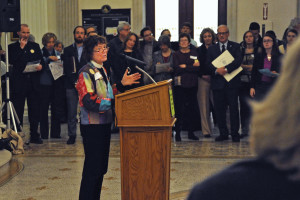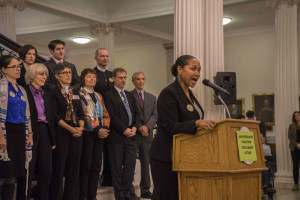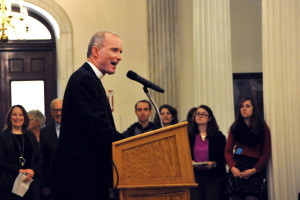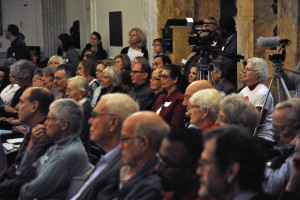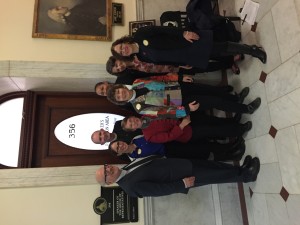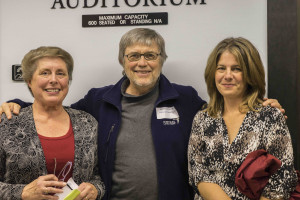You will show me the path of life
“You will show me the path of life; in your presence there is fullness of joy, and in your right hand are pleasures for evermore.” (Psalm 16:11)I am blessed to be with you this morning. Thank you, Thomas, for inviting me. I serve the other diocese in Massachusetts as the Missioner for Creation Care, so I travel from church to church, preaching the Gospel and speaking about our Christian call to protect the Earth. This morning I must begin with a word about the violence in Paris and in Beirut. Our hearts go out to everyone affected by these acts of terrorism, to the people who were wounded and to the innocents who died, to the families who mourn, to the first responders, and to everyone who is playing some part in weaving these two rattled, frightened, assaulted cities back together into a place of security and peace.
These tragic events shock us. They move us to anger, fear, and grief, for we feel a visceral connection with our French brothers and sisters across the Atlantic, with our Lebanese brothers and sisters across the Mediterranean, and with people everywhere who are subject to acts of violence and terror. We share their human vulnerability. We, too, are mortal. Like it or not, we too live in a world of danger, violence, and uncertainty. Jesus also lived in such a world, and every year, in late November, as the cycle of the church year draws to a close and we start to head into Advent, we hear Scripture readings that turn our attention to the end times, giving us images of breakdown and distress. In today’s Gospel passage, just as Jesus is coming out of the temple one of his disciples admires how solid the building is, how large it is, how grand. Surely it will last forever! But Jesus turns to him and says, “Do you see these great buildings? Not one stone will be left here upon another; all will be thrown down” (Mark 13:2). All will be thrown down. He goes on to predict natural disaster and social unrest, “wars and rumors of wars” (Mark 13:7a). “Nation will rise against nation,” he says, “and kingdom against kingdom; there will be earthquakes in various places; there will be famines” (Mark 13:8). Christianity is bracingly realistic about the human condition and the reality of natural disaster and human-caused disaster. Today Jesus predicts suffering and turmoil, and he says, “All will be thrown down.” Yet in the very same passage, in practically the very same breath, he also says: “Do not be alarmed” (Mark 13:7). “Do not be alarmed… This is but the beginning of the birth pangs.” (Mark 13:8). Birth pangs? It seems that Jesus was so deeply rooted and grounded in the love of God, so attuned to God’s dream for the world, so open to God’s creative Spirit and power, that even in the midst of suffering and war, even in the midst of violence, terrorism, and death, he could see beyond everything that was passing away and stand fast in the unshakable, ever-new, ever-abundant love of God. Jesus trusted in God’s abiding presence and in God’s vision for the future. He trusted in God’s dream that human beings can find peace within themselves, with each other, and with the whole creation. Jesus knew that even in the midst of death, something new and holy is being born, and he offered himself to that birthing process as a midwife, a healer and peacemaker. He showed us the path of life and he invited us to walk it with him. I wonder what it would it be like to share so consciously in Jesus’ mission of justice, compassion, and hope that we, too, thought of ourselves as midwives helping a new world to be born. I wonder what it would be like to throw our selves into birthing that new world with the same ardor that Hannah felt as she prayed to conceive and give birth to a child. As we heard in today’s first reading, Hannah prayed so ardently to be a generator of life that the priest who was watching her accused her of being drunk! May we all get drunk like that! Heaven knows that our beautiful, suffering world needs people who are wholeheartedly committed to the struggle to safeguard life as it has evolved on this planet and to conceive and bring forth a compassionate, just, and life-sustaining society. We know what we’re up against. The terrorist attacks in Paris and Beirut are linked with other deadly threats, such as climate change. Researchers tell us that ISIS, the Islamic State, arose partly because of climate change, which caused an extreme drought in Syria between 2006 and 2009. When crops failed, as many as 1.5 million people were forced to migrate from rural areas into cities. Social unrest escalated into civil war and eventually into the multifaceted conflict that now affects many millions of people. Of course climate change is not the only cause of terrorism, but it’s what the Pentagon calls a “threat multiplier.” Earlier this week the World Bank – hardly a leftist organization – warned that unless we change course quickly and rein in greenhouse gas emissions, climate change will drive 100 million people into extreme poverty – extreme poverty – within the next 15 years. We don’t have to be expert analysts in order to grasp how much suffering, upheaval and conflict that would engender worldwide. When I look around, I see a planet at risk of catapulting into runaway climate disruption because of an ever-expanding economic system that depends on fossil fuels. I see terrorism and poverty, rising seas and melting glaciers, and I see people so locked in fear, anger, or despair that they are unable to imagine, much less to create, a better future. It’s as if we’ve fallen under a spell and made what U.N. Secretary General Ban-ki Moon has denounced as a “global suicide pact.” But I also see this: person after person reaching deep into their souls and then standing up to offer their energy and time to the shared struggle to re-weave the fabric of life and to create a just and sustainable future. I see a wave of religious protest and activism rising up around the world, propelled in part by the release of Pope Francis’ groundbreaking encyclical, Laudato Si, which makes a powerful connection between the cry of the earth and the cry of the poor. I see people rising up for life, refusing to settle for a killing status quo, and proclaiming with one voice that climate change is a spiritual and moral issue that must be tackled without delay. Just think of all the signs we see of a new social order being born. We see people blocking the path of new fracked gas pipelines and being arrested for civil disobedience as they read aloud from Pope Francis’ encyclical. We see people lobbying for a fair price on carbon, so that we can build a clean green economy that provides decent jobs and improves public health. We see our own Episcopal Church deciding – miracles of miracles! – to divest from fossil fuels, since it makes no financial or moral sense to invest in companies that are ruining the planet. We see new coalitions being formed and new alliances forged, as people realize that the environmental crisis is closely connected with the social crises of poverty, income inequality, and racial injustice. Just this week I spent a day lobbying at the State House with a new interfaith coalition that is dedicated to climate justice right here in Massachusetts. Together we are fighting to keep fossil fuels in the ground and to accelerate a transition to clean, safe, renewable sources of energy, such as sun and wind, that are accessible to all our communities, including low-income. As climate activist Bill McKibben has pointed out, “The fight for a just world is the same as the fight for a livable one.” The Church was made for a time like this – a time when God calls human beings to know that we belong to one Earth, that we form one human family, and that God entrusted the Earth and all its residents to our care. We may live in a society where we’re told that pleasure lies in being self-centered consumers who grab and hoard everything we can for ourselves and the devil take the hindmost, but we know the truth: our deepest identity and joy is found in being rooted and grounded in love and in serving the common good. With the psalmist, we turn to our Creator, Redeemer, and Sustainer, and say: “You will show me the path of life; in your presence there is fullness of joy, and in your right hand are pleasures for evermore” (Psalm 16:11).